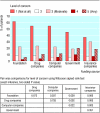Patients' consent preferences for research uses of information in electronic medical records: interview and survey data
- PMID: 12586673
- PMCID: PMC148897
- DOI: 10.1136/bmj.326.7385.373
Patients' consent preferences for research uses of information in electronic medical records: interview and survey data
Abstract
Objectives: To assess patients' preferred method of consent for the use of information from electronic medical records for research.
Design: Interviews and a structured survey of patients in practices with electronic medical records.
Setting: Family practices in southern Ontario, Canada.
Participants: 123 patients: 17 were interviewed and 106 completed a survey.
Main outcome measures: Patients' opinions and concerns on use of information from their medical records for research and their preferences for method of consent.
Results: Most interviewees were willing to allow the use of their information for research purposes, although the majority preferred that consent was sought first. The seeking of consent was considered an important element of respect for the individual. Most interviewees made little distinction between identifiable and anonymised data. Research sponsored by private insurance firms generated the greatest concern, and research sponsored by foundation the least. Sponsorship by drug companies evoked negative responses during interview and positive responses in the survey.
Conclusions: Patients are willing to allow information from their medical records to be used for research, but most prefer to be asked for consent either verbally or in writing.
Figures
Comment in
-
Difficulties in giving fully informed consent.BMJ. 2003 May 10;326(7397):1039. doi: 10.1136/bmj.326.7397.1039/a. BMJ. 2003. PMID: 12742940 Free PMC article. No abstract available.
References
-
- Woodward B. Challenges to human subject protections in US medical research. JAMA. 1999;282:1947–1952. - PubMed
-
- Anon. Canadians and the confidentiality of their personal health information. Toronto: Angus Reid Group; 1999.
-
- Policy and Planning Division Saskatchewan Health. Consultation paper on protection of personal health information, 1998. www.health.gov.sk.ca/ph_br_health_leg_phiq/default.htm (accessed 18 Dec 2002).
-
- Morgan R. Privacy and the community. Sydney, NSW: Office of the Federal Privacy Commissioner; 2001.
Publication types
MeSH terms
LinkOut - more resources
Full Text Sources

